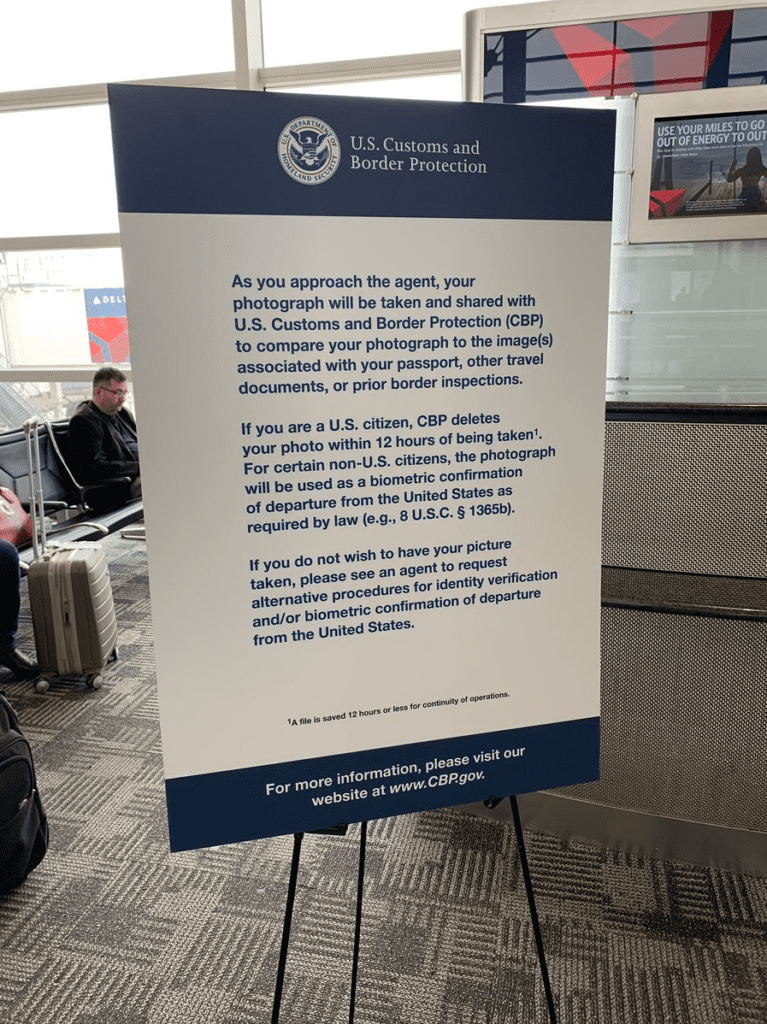If DHS has its way, U.S. citizens may soon be forced to undergo a facial scan when entering or leaving the country.
Earlier this year, we wrote about U.S. Customs and Border Protection’s (CBP) slow rollout of facial recognition technology at various airports. U.S. citizens have been able to opt-out and choose, “alternative procedures for identity verification and/or biometric confirmation of departure from the United States.”

Source: Twitter/Juli Lyskawa
However DHS is now proposing an amendment to the rules, wherein U.S. citizens could no longer opt out:
“The Department of Homeland Security (DHS) is required by statute to develop and implement a biometric entry-exit data system. To facilitate the implementation of a seamless biometric entry-exit system that uses facial recognition and to help prevent persons attempting to fraudulently use U.S. travel documents and identify criminals and known or suspected terrorists, DHS is proposing to amend the regulations to provide that all travelers, including U.S. citizens, may be required to be photographed upon entry and/or departure.”
The proposed rule change already has the American Civil Liberties Union, one of the largest civil liberties groups in the country, alarmed.
“Time and again, the government told the public and members of Congress that U.S. citizens would not be required to submit to this intrusive surveillance technology as a condition of traveling,” ACLU senior policy analyst Jay Stanley said in a statement. “This new notice suggests that the government is reneging on what was already an insufficient promise.”
“Travelers, including U.S. citizens, should not have to submit to invasive biometric scans simply as a condition of exercising their constitutional right to travel,” Stanley continued. “The government’s insistence on hurtling forward with a large-scale deployment of this powerful surveillance technology raises profound privacy concerns.”
There are several privacy and security concerns that we mentioned in our earlier post. A 2018 internal audit found technical and operational problems during a pilot program at nine U.S. airports. There was also a DHS data breach of nearly 100,000 license plate and traveler images in June 2019. So the concern is not unrealistic.
Concern notwithstanding, of the 19,000,000 travelers who’ve been scanned with facial-recognition technology in airports and at borders since the rollout began in 2017, DHS has identified a little less than 150 “imposters” (6 at airports, 135 at pedestrian border patrols) carrying fake documents, The Hill reported in June.
The proposed regulation is slated to be issued in July 2020 by DHS. A Customs & Border Protection spokesperson said the agency was “currently in the rulemaking process and will ensure that the public has the opportunity to comment prior to the implementation of any regulation,” and that it was “committed to its privacy obligations.”
Riiiiiiight…
Like this post? Please share it! We have plenty more just like it and would love if you decided to hang around and clicked the button on the top (if you’re on your computer) or the bottom (if you’re on your phone/tablet) of this page to follow our blog and get emailed notifications of when we post (it’s usually about 3 or 4 times a day). Or maybe you’d like to join our Facebook group, where we talk and ask questions about travel (including Disney parks), creative ways to earn frequent flyer miles and hotel points, how to save money on or for your trips, get access to travel articles you may not see otherwise, etc. Whether you’ve read our posts before or this is the first time you’re stopping by, we’re really glad you’re here and hope you come back to visit again!
This post first appeared on Your Mileage May Vary

7 comments
already on entry ?
Yes, but for U.S. citizens, it’s only been optional. Come sometime after July, that won’t be the case anymore.
I must have missed the optional part last trip through lax
I don’t think they necessarily tell you it’s optional. But for right now you have the right to say no. Come next summer, probably not so much.
And, of course, if you have Global Entry, your photo is already part of that anyway.
I just experienced this at an airport in China. It was great fun and I was impressed to just stand there grinning while my flight information flashed up on the board. I’m just not the type to worry about my civil liberties, I guess.
This was decided against – it isn’t happening right now:
https://techcrunch.com/2019/12/05/homeland-security-drops-airport-citizens-face-scans/
Thanks for the update, Marc!